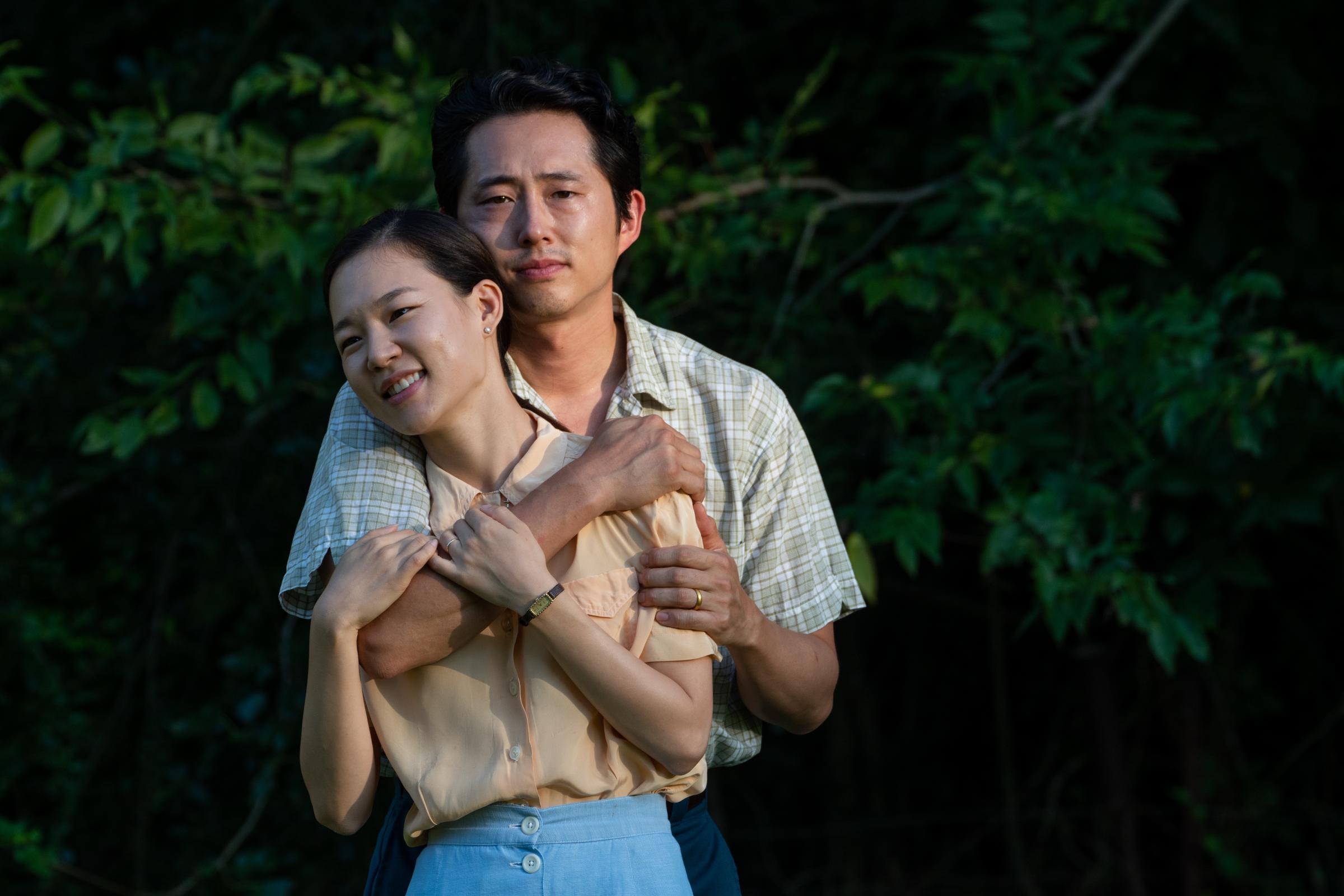Most stories about immigrants adjusting to America take place in cities, environs where a newcomer may already have family or friends, or at least be able to find a community. The family in writer-director Lee Isaac Chung’s Minari takes a different route: Jacob and Monica (Steven Yeun and Yeri Han) have come to America from Korea to seek better opportunities—we don’t know much more than that. But we do learn that Jacob has a dream of growing things, of being a farmer. Jacob, Monica and their two young children, David and Anne (Alan Kim and Noel Cho), have lived for a time in California, but as the movie opens, we see them driving to what will be their new home: A blocky rectangle of a house propped on cinderblocks, adjacent to a stretch of land that looks like paradise to Jacob—but not to Monica. She says little at first, but her stern silence tells us what she’s thinking: Why have you brought us here? This is 1980s Arkansas; there may be a few Koreans here and there, but there’s not much of a community. What’s more, David has a health issue, a weak heart. How could Jacob have brought his family so far from a hospital, from civilization?
Minari is a gentle, lovely picture, one that acknowledges there really is no “immigrant experience,” beyond the pure human experience of finding yourself adjusting to a new environment. The film—which is semi-autobiographical, reflecting Chung’s own experience of growing up on a farm in rural Arkansas—enfolds reflections on isolation and loneliness, on masculine pride and duty, on just the pure weirdness of being a kid, let alone the child of immigrants. If its setting is specific, its vibe is universal.

Chung tells us everything about this family via small details, often seen through David’s eyes: we get an inkling of his heart problem when we see him running across a field—and then stopping abruptly, sullenly, when his mother calls out, “Don’t run!” Jacob works on getting the farm started in his spare time—he hires a helper, Paul, a local oddball and religious nut whose generosity is revealed in quiet, quirky moments. (He’s played, wonderfully, by Will Patton.) But Jacob and Monica also have jobs at a local hatchery, determining the sex of chicks. When David asks about the smoke rising from a smokestack at the plant, his father tells him that that’s where the male chicks are burned. They don’t taste good, and they don’t lay eggs, so they’re of little use. “So you and I should try to be useful,” he tells his son, a hint at how heavily the responsibility of being the man of the house—and of providing for his family—weighs on his own shoulders. Yeun’s performance is terrific, a multilayered exploration of what it means to chase a dream when reality—your family, the people you’re entrusted to care for—is sitting right there with you at the dinner table.
Read More: Minari and the Real Korean-American Immigrants Who Have Farmed U.S. Soil For More Than a Century
Monica is lonely and unhappy on this farm in the middle of nowhere. When she and Jacob fight, David and his sister send a squadron of paper airplanes—crayoned with the words “Don’t fight!”—soaring into their parents’ airspace. Their desperation, and their rapid action, captures the delicate texture of children’s helplessness and fears in the face of their parents’ problems. Eventually, Jacob and Monica hammer out a tentative solution to their differences of opinion: Monica’s mother will come—from Korea—to live with the family.
When Soonja (Youn Yuh-jung) arrives, bringing with her special chili powder, anchovies, ground antler and other delights that can’t easily be procured on American shores, David sulks. She isn’t, as he protests both to his parents and directly to her, “a real grandma.” Soonja doesn’t make cookies; in fact, she can’t cook at all. She likes playing cards, watching wrestling on television, and swearing. David complains that she “smells like Korea.” Soonja seems unable to win him over, until they reach a truce—the specifics of which involve a plot detail that’s best left unrevealed.
Read more reviews by Stephanie Zacharek
Minari debuted at Sundance in 2020 and has since gathered steam as an awards contender. It’s a Golden Globe nominee in what the awarding group, the Hollywood Foreign Press Association, calls its Foreign Language category. It’s sure to be nominated for an Oscar as well, although the Academy of Motion Picture Arts and Sciences last year changed the name of its Foreign Language category to International Feature Film. Where, exactly, does Minari fit? It’s largely in Korean, with English subtitles, so if English is the default language here, “Foreign Language” isn’t technically inaccurate. But Minari was made by an American filmmaker, is set in Arkansas, and was filmed in Oklahoma, and it’s an undeniably American story.
The categorization confusion isn’t the film’s problem—Minari stands on its own merits. But the conundrum does suggest how provincially minded our awards groups, and our own views as Americans, can be. To find a convenient box for this splendid, thoughtful and funny film is impossible, especially in an era when the people who have the most invested in America are often those who have come from elsewhere—or whose parents did—often at great personal cost. Minari is neither “foreign” nor “international.” It is, simply, about a place called home.
More Must-Reads from TIME
- Caitlin Clark Is TIME's 2024 Athlete of the Year
- Where Trump 2.0 Will Differ From 1.0
- Is Intermittent Fasting Good or Bad for You?
- The 100 Must-Read Books of 2024
- Column: If Optimism Feels Ridiculous Now, Try Hope
- The Future of Climate Action Is Trade Policy
- FX’s Say Nothing Is the Must-Watch Political Thriller of 2024
- Merle Bombardieri Is Helping People Make the Baby Decision
Contact us at letters@time.com